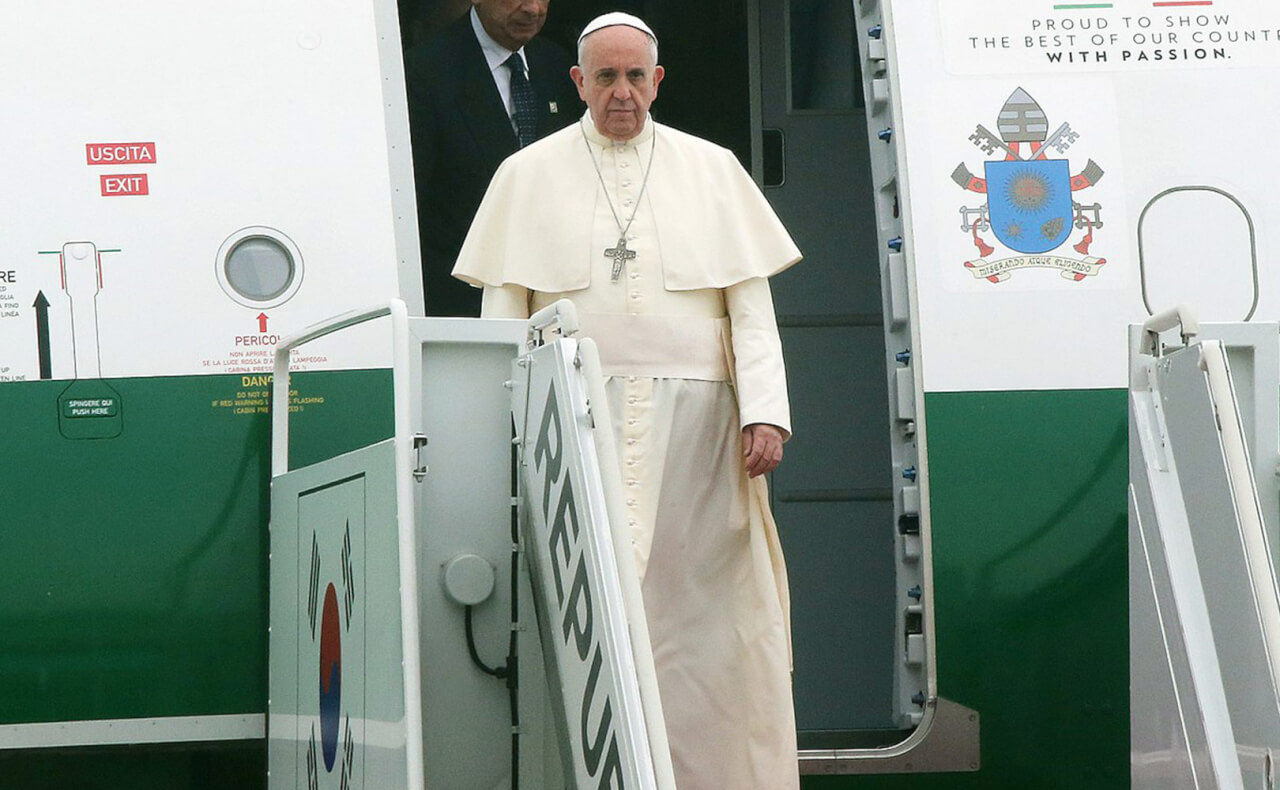(Image Attribution: Korea.net / Korean Culture and Information Service; CC 2.0)
Tomorrow, 6 September, Pope Francis will arrive in Colombia on an official visit. This papal trip has raised opposition from some quarters against both the pope himself and some of his teaching. Additionally, in light of the ongoing humanitarian crisis in Colombia’s neighbor Venezuela, the pope has received much criticism for his lack of any explicit and sound rebuke of the Venezuelan President, Nicolás Maduro. OnePeterFive has repeatedly reported on the grave and protracted injustices committed by Maduro, and thus the sustained silence of Pope Francis has become striking, particularly since he is known for his readiness to rebuke “unmerciful” politicians.
Of note amongst the voices bringing these questions to light is Giuseppe Nardi, the well-informed and learned German reporter, who has translated statements made on radio with regard to this upcoming papal visit. On 31 August, the Colombian RCN radio station quotes a priest who will meet personally with Pope Francis and who wishes to present him with some points of criticism, saying that there are “many” who believe that Pope Francis “is linked with Freemasonry.” The priest in question wishes to remain anonymous, but claims that “ninety more priests” are in agreement with him in criticizing the path upon which Francis is leading the Church. The priest also says: “In the Catholic Church, there is also opposition to the visit of the pope [in Colombia].” The following quotes stem from RCN Radio’s own report about this priest’s words:
Also Catholic priests are among the people who oppose the papal visit in Colombia, because they believe that Francis, with his statements – especially concerning topics such as homosexuality and the family – has done damage to the Magisterium of the Church.
The radio station reports that this anonymous cleric has been a priest in Bogota for twenty years. He claims to know – in Bogotà, Medellín, and in Bucarmanga – at least ninety priests who think like him and who do not agree with the way the pope handles the Church. The priest says, according to the radio station:
Priests from different dioceses – I cannot name them for different reasons – are praying that the pope will not step on Colombian soil. Many prayer groups are praying that he will not come.
In a new article published today by the Wall Street Journal, entitled “Venezuela’s Crisis Looms Large as Pope Visits Latin America,” we see additional signs that this Latin American pope is not welcome in his own native region of the world. The Journal quotes others who are raising questions about the pope’s visit, especially regarding the way he has handled the Vatican’s intervention into the Venezuelan crisis — a crisis that has led many Venezuelans’ to flee into neighboring Colombia:
Heilyn Rojas, a 21-year-old Venezuelan student, left her country last year, tired of the crime and food shortages back home. She fled to neighboring Colombia in search of a better life.
Now, on the eve of Pope Francis’ five-day visit to Colombia, she stands among many Venezuelans, including bishops and opposition leaders, who hope the pontiff will chastise Venezuelan President Nicolás Maduro for his role in the nation’s economic collapse and its deep political strife.
The article shows a picture of President Maduro holding up a crucifix that he had received as a gift from Pope Francis himself. As the U.S. journalist and book author George Neumayr recently illustrated, Pope Francis has repeatedly shown sympathies toward revolutionary socialist leaders in South America. When asked in an interview about the papal support for the World Meeting of Popular Movements, Neumayr says:
It is a collection of radicals and socialists. In 2016, they gathered in Bolivia to celebrate among other things that the papacy had fallen into their hands. Pope Francis shared the platform with Bolivia’s Marxist president [Evo Morales], who was wearing a jacket emblazoned with a picture of Che Guevara.
Francis used his speech to urge the attendees to keep agitating against the “new colonialism,” which he equated with budget-cutting, free-market-oriented governments. The speech was catnip for the communists in the audience.
Bolivia’s president said afterwards that he “finally” could follow a pope.
So, too, with Venezuelan President Maduro. As the Wall Street Journal puts it: “Many Venezuelans are angry over the Vatican’s failed attempt to broker a truce between the opposition and Mr. Maduro’s envoys during talks late last year.” In spite of these negotiations, Maduro continues the persecution of his opposition and his unmistakable establishment of an increasingly dictatorial reign. The article continues:
The opposition and some clergy blamed the Vatican for allowing Mr. Maduro to stall for time, thus dissipating protests and ultimately tightening his grip on the country.
“The Vatican’s diplomacy sinned with naiveté. They came unprepared,” said the Rev. Francisco Virtuoso, rector of Caracas’s Andrés Bello Catholic University and a prominent critic of Mr. Maduro’s government. “The government exploited this to the full.”
While the Venezuelan bishops are publicly calling upon the Blessed Virgin Mary to “free our country from the clutches of communism and socialism,” explains the article,
Mr. Maduro accuses the local church hierarchy of joining the political opposition to topple his government and claims the pope supports him, disagreeing with critics including Vatican Secretary of State Cardinal Pietro Parolin.
It is in this line of argument that the Wall Street Journal article ends when it says:
Critics have suggested that [the] pope, who has appeared publicly with some of Mr. Maduro’s left-wing allies such as Bolivian President Evo Morales and shares some of their political views, might be holding back out of ideological sympathy.
“I’m a Catholic, but I think that seeing the pope doing these sorts of things pushes me away from the Church,” said Rocksaneth Aguilar, a Venezuelan advertising agent who moved to Colombia last year. “The pope is a communist at heart who doesn’t want to get involved in Venezuela.”


